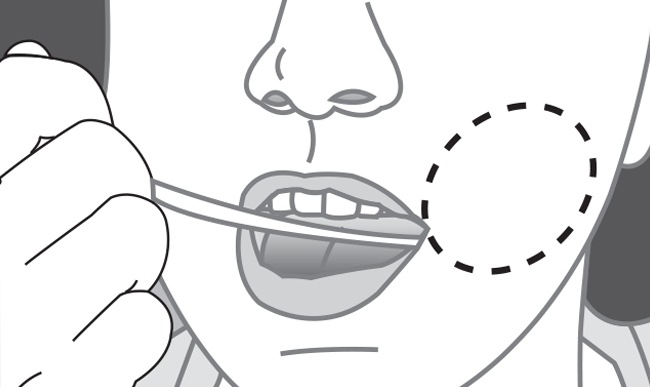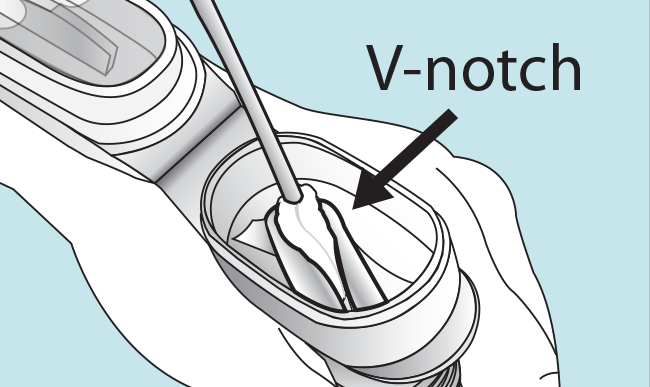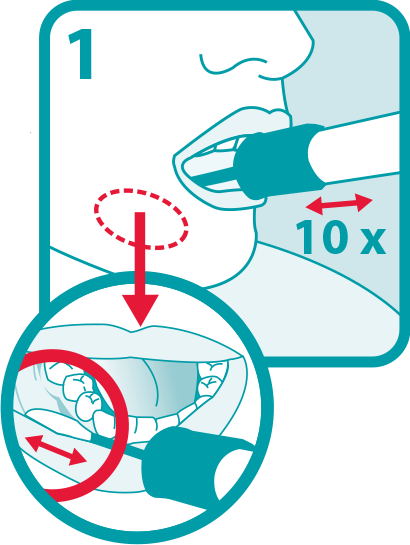Test Code LAB3869 Alternate Specimen Collection Kits for Genetic Testing
Background
- Blood is often the preferred sample type for genetic testing, due to the large amounts of high-quality DNA that can be extracted from the white blood cells. DNA from saliva and buccal specimens can be contaminated with microbial and food DNA especially if at home collection instructions are not followed, this can impact specimen quality and may result in delayed testing and/or the need for a second specimen. Since alternative specimen kits are collected by the patient at home, they also have higher rates of mislabeling issues which can delay testing or result in a recollection. However, alternate sample types, like saliva and buccal cells, can often provide enough high-quality DNA to perform most genetic testing and are ideal for certain patients when collecting a blood sample is not feasible and/or if saliva or buccal are the preferred sample type for testing based on the clinical scenario..
- It is up to the clinician to decide the best sample type for each test. Certain clinical scenarios may require a specific sample type in order to provide the most accurate genetic test results. For example, affected tissue may be preferred over blood in a patient with a suspected mosaic condition, but saliva or buccal may be preferred over blood in a patient who has had a bone marrow transplant.
-
The following alternate sample kits are offered by many reference labs. Refer to the table below or the specific reference lab’s website for the type(s) of alternate specimen(s) accepted by the laboratory for genetic testing.
-
Saliva Kit: Donor physically provides a saliva sample by spitting directly into a collection funnel and tube. The DNA from saliva samples is extracted from the cheek skin (buccal) cells and white blood cells in the saliva.
-
Assisted Saliva Kit: An absorbent swab is used to soak up the saliva in the mouth of the donor, then the swab is wrung out into a collection funnel and tube. This action is repeated until the correct volume of saliva has been collected. The DNA from assisted saliva samples is extracted from the cheek skin (buccal) cells and white blood cells in the saliva.
-
-
Buccal Kit: A swab is used to brush the inside surface of the cheek and along the gumline to collect cheek skin (buccal) cells. The DNA from buccal samples is extracted from those cheek skin cells.
-
Saliva Kit: Donor physically provides a saliva sample by spitting directly into a collection funnel and tube. The DNA from saliva samples is extracted from the cheek skin (buccal) cells and white blood cells in the saliva.
Helpful Hints
- It is critical to clearly follow the instructions for alternate specimen collection to prevent the need for recollection. Alternate specimen kits always incur the risk of needing to recollect.
- Not all labs with saliva kits offer an assisted saliva collection method. Labs with an assisted saliva kit option are noted below. If the kit option is listed as saliva only, there is no assisted version available.
- Saliva kits (non-assisted versions) are not recommended for children under 2-3 years old. The donor must be able to spit directly into the collection tube on their own.
- Buccal swab kits are a better option for young children and babies, and for people who may not be physically able to give a saliva sample.
- SCH in-house testing offered on saliva samples is not validated for children less than 6 months old. Additionally, not all in house tests accept saliva samples. Please refer to the LabMan page for each specific test.
Sample Stability: Refer to any specific requirements on the performing refernece lab's website, but if the kit is not expired, samples are typically stable for 60-90 days after collection
How to Request a Kit for Your Patient
Note: If the patient had a genetic test perfomed in the SCH in-house lab within the last year, there may be residual DNA available to add onto or send out for additional genetic testing. Please email the Lab DNA Bank team to check on the availability of residual DNA or with questions about this.
Tests performed for a charge: If an alternate specimen is acceptable, please follow the steps below to collaborate with the SCH Reference Lab Team for remote sample collection of testing that will be performed at a charge to the patient. Insurance preauthorization is required before testing can be coordinated.
- Provider enters test order(s) in Epic as "Active - Future"
- Care team communicates outcome of preauth to family, lets them know that a kit will be mailed to them for sample collection, and the kit should be sent back in the envelope provided. Care team confirms patient’s preferred mailing address during this communication
- Care team places a Genetic Test Kit Request [LAB3869] order in the patient's Epic chart and emails Reference Lab Team the clinical history documentation ± lab requisition, if needed
- Reference Lab Team sends kit to family
- Patient collects sample & returns to SCH Reference Lab Team in envelope provided
- Reference Lab Team activates orders once sample received
Collected Kit Drop Off Handoff Form – Download here. Collected Kit Drop Off Instructions (for saliva/buccal specimens collected in clinic): View instructions
External Client Kit Request Form - external clients (non-Seattle Children's Patient's), please use the External Client Kit Request Form – Download here
Kits Available for Alternate Specimen Collection
| Reference Lab | Available Kit Option(s) | Kit Model # | Notes |
| SCH |
|
|
Oragene OGD-575 kit allows for both assisted and unassisted saliva sample collection. Saliva/Assisted Saliva is not accepted for tests performed in the SCH laboratory from babies less than 6 months old. |
| GeneDx |
|
|
GeneDx kits include 2 buccal swabs per kit. |
| PreventionGenetics |
|
|
Saliva and buccal are both generally accepted sample types at PG. Saliva is preferred over buccal if the donor is physically able to give the sample and/or is clinically indicated due to greater amount of DNA collected in a saliva sample. |
| UW NCGL/CDL/CPDx & UWMC (includes exomes) |
|
|
|
| UAB |
|
|
Oragene OGD-575 kit allows for both assisted and unassisted saliva sample collection. |
| Invitae |
|
|
|
| MNG |
|
|
|
| U of Chicago |
|
|
U of Chicago's buccal kits include 4 swabs per kit. |
| U of Iowa (MORL) |
|
|
U of Iowa MORL's buccal kits include 4 buccal swabs per kit. |
| U of Pennsylvania |
|
|
Oragene OGR-575 kit allows for both assisted and unassisted saliva sample collection. |
| CTGT |
|
|
Oragene OGD-575 kit allows for both assisted and unassisted saliva sample collection. |
| Lineagen |
|
||
| Baylor |
|
|
|
| Johns Hopkins |
|
||
| Myriad |
|
|
|
| Ambry |
|
|
Ambry's kit includes 2 assisted saliva collection containers per kit. |
| PerkinElmer |
|
|
|
| LabCorp |
|
|
|
| UCLA |
|
||
| OHSU (Knight Diagnostic Laboratories) |
|
|
OHSU's kit includes 2 saliva collection containers per kit. |
Resources for Sample Collection
-
Printable Instructions:
-
SCH Assisted Saliva Kits: Refer to the "How to Collect a Saliva Sample: Oragene DX OGD-575 or OGD-675 test kit" document (PE3050) on CHILD.
- Multiple languages available! Translations to other languages done by request in the Epic Genetic Test Kit Request order.
-
DNA Genotek Brand Kits (widely used by many labs), various languages available:
- Saliva Kit (used by UW and many others): OGD-500/600
- Assisted Saliva Kit (used by SCH, UAB, U Penn, and CTGT): OGD-575/675
- Buccal Swab Kit (used by Blueprint, GeneDx, PreventionGenetics, and most labs that offer buccal kits):
- Isohelix Brand Saliva Kit (used by PreventionGenetics)
-
SCH Assisted Saliva Kits: Refer to the "How to Collect a Saliva Sample: Oragene DX OGD-575 or OGD-675 test kit" document (PE3050) on CHILD.
-
Video Instructions
- Saliva Kit (used by UW labs and many others): Oragene.Dx Video Collection Instructions
- Saliva Kit used by PreventionGenetics: Isohelix™ GenefiX™ Saliva DNA/RNA Collection
- Assisted Saliva Kit (used by SCH, UAB, UPenn, and CTGT): Oragene.DNA OG-575 format (Assisted Collection Kit) User Instructions
- Buccal Swab Kit (used by GeneDx, PG, and most other labs that offer buccal kits): ORAcollect.Dx (OCD-100/OCD-100A) Collection Instructions




